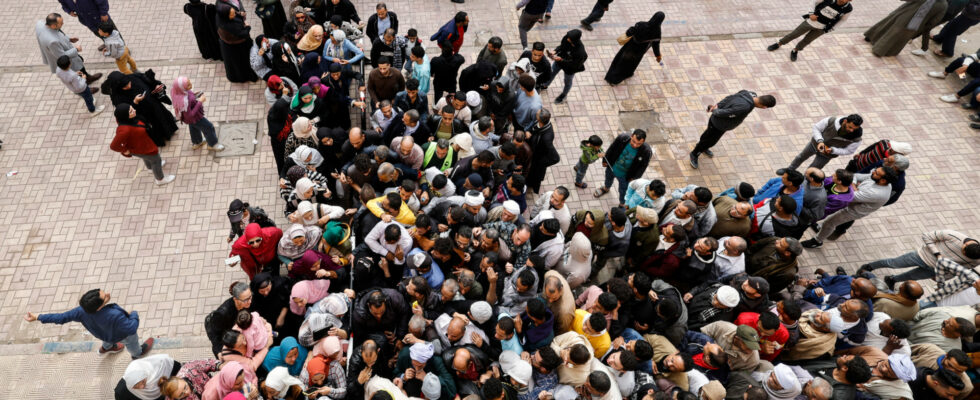In the country of 106 million inhabitants facing the most serious economic crisis in its history, purchasing power is the priority, with two thirds of the population living below or just above the poverty line. Some 67 million voters are expected to vote on Sunday, Monday and Tuesday from 7 a.m. to 7 p.m. (GMT) before the official results on December 18. Dozens of voters of all ages crowded in front of schools in central Cairo on Sunday, amid heavy security and under posters proclaiming “Go out and participate” to the sound of nationalist chants.
Three other candidates generally unknown to the general public
Apart from the outgoing president, three candidates generally unknown to the general public are in the running: Farid Zahran, at the head of the Egyptian Democratic and Social Party (left), Abdel-Sanad Yamama, from the Wafd, a century-old but now marginal party, and Hazem Omar, of the Republican People’s Party. “I only know President Sissi, I don’t know the other candidates,” Asmaa Rafaat, a forty-year-old who votes in Cairo, told AFP.
Despite Egypt’s difficulties, no serious opposition seems to exist under the reign of Sissi, the fifth president from the ranks of the army since 1962, who rules the country with an iron fist.
“Stifling atmosphere”
Far from exciting the crowds, the presidential campaign took place in November in the shadow of the war between Israel and Palestinian Hamas, which monopolizes the attention of the media and public opinion. Talk shows, close to the intelligence services and fervent supporters of President Sissi, are now trying to link the two. “There are two million (Gazans) who want to return home (…), we cannot sit and watch, we are going to go out and say ‘no to the transfer'” of the Palestinians, pleads presenter Ahmad Moussa, repeating word for word a speech by Abdel Fattah al-Sissi at the start of the war.
“We need someone capable of managing what is happening on the border with Gaza,” says a fifty-year-old voter who refuses to give her name, for whom the question takes precedence over “the cost of living”. Fethi Ali, 79, votes in central Cairo and only wants one thing: “that the next president establishes health coverage for all”, one of the major projects of the Sissi presidency, which is struggling to take off .
Journalist and activist Khaled Dawood denounces “a stifling atmosphere of suppression of freedoms, total control of the media, and security services which prevent the opposition from taking action in the streets”. “We have no illusions: the vote will be (…) neither credible nor fair,” he wrote on Facebook. But he will vote for Zahran, in order to “send a clear message to the regime”: “we want change”, because “after ten years, the living conditions of Egyptians have deteriorated and we risk bankruptcy because of (his ) policy”.
Painful reforms
In the presidential elections of 2014 and 2018, former Marshal Sissi, who came to power in 2013 by overthrowing the Islamist Mohamed Morsi, won with more than 96% of the votes. He has since extended the length of the presidential term from four to six years and amended the Constitution to extend the limit from two to three consecutive presidential terms. In the last presidential election, participation reached 41.5%, six points less than in the previous election.
But many Egyptians believe that Sissi is the architect of the return to calm after the chaos following the “revolution” of 2011 and the fall of Hosni Mubarak after 30 years of reign. From the start of his first mandate in 2014, Abdel Fattah al-Sissi promised to bring stability, including economic stability. An ambitious but painful reform program, with devaluations and reductions in state subsidies, has been undertaken since 2016.
Measures which led to a surge in prices, fueled discontent among the population and saw Sissi’s popular base and even foreign support decline over the years. The debt has tripled, and the mega-projects often attributed to the army have so far not produced the promised returns. But, notes researcher Yezid Sayigh, “Abdel Fattah al-Sissi cannot impose changes on the army, because it could cost him his presidency.” “The next president must improve our living conditions and lower prices,” despite everything, demands Asmaa Rafaat, the Cairo voter.
